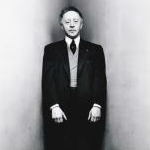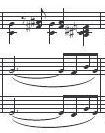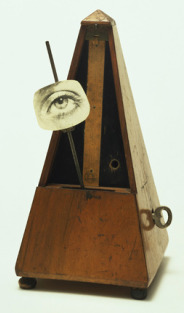A transcript of my spoken remarks at Boston University last week, as part of a symposium on piano sonatas by Beethoven. “I’d like to talk about what I would call anomalies in my own reception of Beethoven’s piano sonatas. “I can certainly remember -- as I’m sure many of you can remember -- a time when I first played through a piano sonata by Beethoven from beginning to end, in a kind of performance. It was in my living room, I think I was … [Read more...]
Labor Management
Sound recordings from the first decades of the 20th century form a performance-practice treatise, documenting practices that may offer insight into music-making of earlier times. In the case of piano music, very many of these recordings are recordings of Chopin’s music. There are a lot of recordings of short pieces. (The length of one cylinder and later one “side” of a disc was around 3 minutes.) Chopin: Waltz in A Minor, op. 34, no. 2, Robert … [Read more...]
Rhythm Puzzle
In playing piano duets or two-piano music, just being together is particularly challenging. The beginning of the sound of a note played on the piano is definite and sudden. What might pass for good ensemble playing in the performance of a piece for violin and piano (with the violin's characteristically less-instantaneous note-beginnings), will be unsatisfying in 2-piano playing. Pianists playing together become note-arrival authorities. As I was … [Read more...]
Bachtrauma
Gerhard Richter: Bach (1992) In my dream, J. S. Bach arrives to play on the clavier some of the pieces he's written down, but as he plays, the strangeness of the temperament and lowness of pitch, the flexibility of beat and rhythmic declamation yields some of the things he plays unrecognized, for moments, or even a long while. This music that we own, this familiar canon, under his fingers it is so strange, so far from the received … [Read more...]
Case Law
Setting out to learn a piece of scripted classical music, a pianist usually looks at print. Some musicians listen to recordings. A celebrated American violin pedagogue sent her young virtuosos to listen to five or six recordings of a new piece. The kids calculated the speed of each performance with a metronome, averaging the numbers together to determine the right tempo for their own performance -- a focus group for tempo! Other teachers … [Read more...]
Precedent
Near the beginning of T. S. Eliot's "Portrait of a Lady" there are these lines: "We have been, let us say, to hear the latest Pole Transmit the Preludes, through his hair and fingertips." Were those the celebrated red locks of Paderewski? Like many Poles playing the piano, he specialized in Chopin. There were so many Chopinists in the early years of the twentieth century -- just as sound recording really got going -- that, although we … [Read more...]
Beat It
Walking across the campus of a big Midwestern university, I hear drumming. The drumline from the school's marching band is practicing outdoors, with a very loud metronome. Big speakers blast out the regular electric beats -- quite a lot louder than twenty drummers drumming. These beats sound like gunshots. The music is intricate with a lot of syncopation, and these kids fit it all in, around the clicks. This kind of practicing is not so … [Read more...]
In one
After many years, I figured out what many eighteenth-century musicians must have known: 9/8 meter is in three. (There are three beats in each measure.) 9/16 meter is in one. … [Read more...]
Can we play too well?
It's been suggested (by Charles Rosen) that a pianist who plays difficult passages notated in Robert Schumann's piano music, to today's standard of accuracy, is not giving an "authentic" reading. No one in the early nineteenth century could have done it, so, the argument goes, "mistakes" would be part of "authenticity." (We might speculate on the impact the sounds made or make...) In Ghent, a year and a half ago at the Orpheus Institute, we … [Read more...]
Pianoscape
Plants form a plantscape -- more or less continuous -- across a continent: the carefully tended jardin and the yard of "weeds" surrounding an abandoned house. Fallen dead trees in a forest, or overgrown city lots might seem like problems in need of solving... Elite classical musicians have often held themselves apart from other musicians, or even other classical players: "I'm better that that." "His playing was so stupid," or "uninvolved," or … [Read more...]










